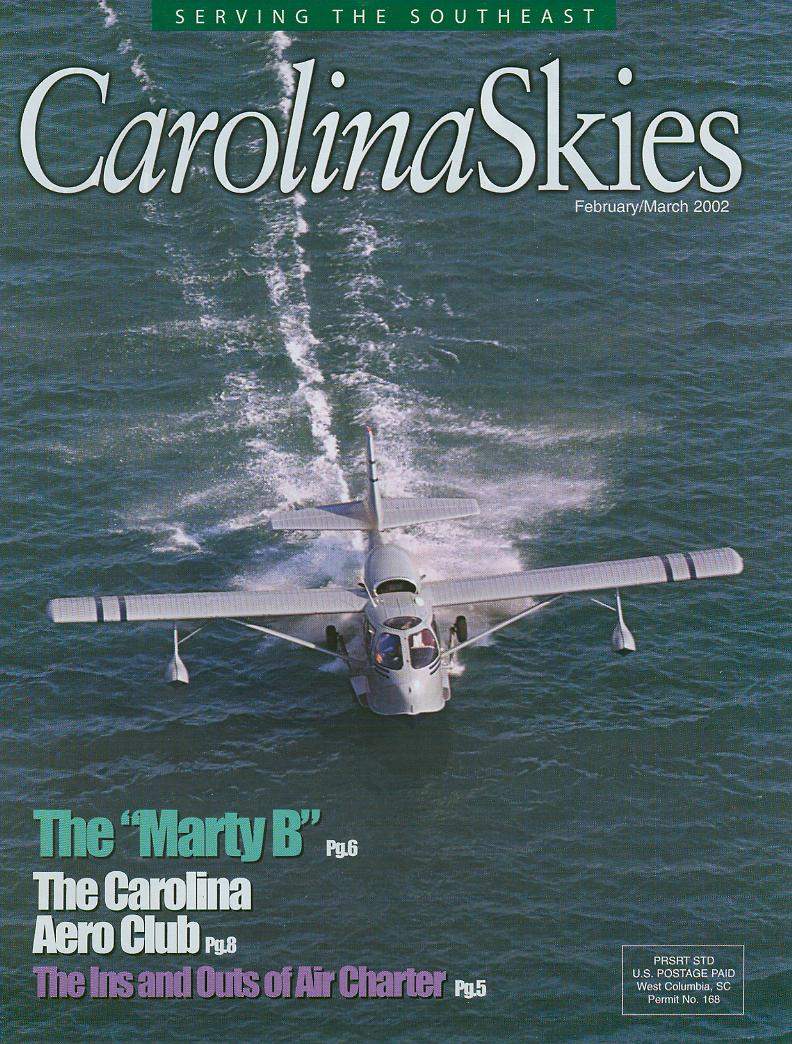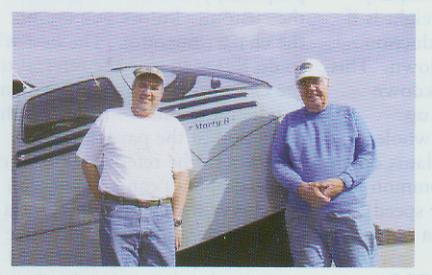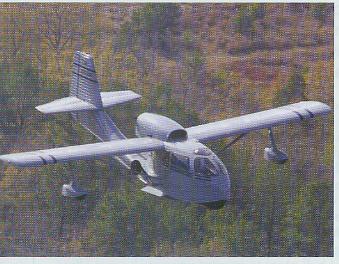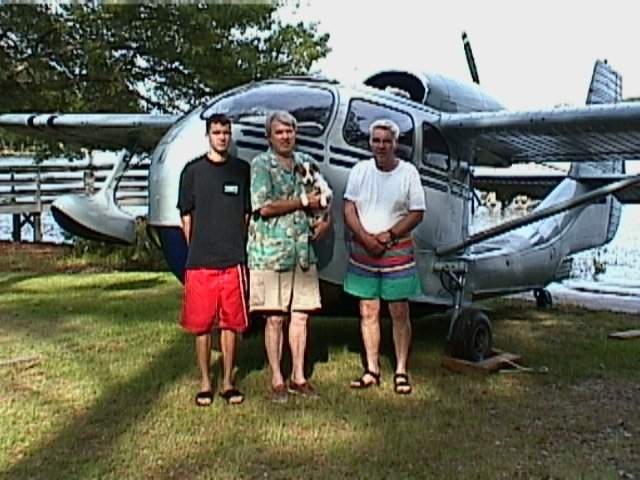 The International Seabee Owners
Club takes pride in the following articles on Seabee ownership,
published in the magazine "Carolina Skies" Feb/Mar 2002 issue, written
by owner-member Capt Steve Mestler. Permission to publish has been
obtained from the magazine and the author. The International Seabee Owners
Club takes pride in the following articles on Seabee ownership,
published in the magazine "Carolina Skies" Feb/Mar 2002 issue, written
by owner-member Capt Steve Mestler. Permission to publish has been
obtained from the magazine and the author.
*THE
MARTY B*
The Seabee featured in
this edition of Carolina Skies is owned by Don and Steve Mestler of
Gilbert, South Carolina. It was purchased in April 2000 from the estate
of Mr. Marty Bennett of Griffin, Georgia.
Marty Bennett worked,
for ten years to completely restore and upgrade Seabee N9042N. It took
the parts of three Seabees to make it! Except for the intercom, gear
position advisory system (GPAS) and other small additions, the plane is
just as it was when Mr. Bennett owned it. He died of a heart attack a
few years ago and in his honor the Mestlers named the Seabee "The Marty
B" feeling that anyone spending ten years of their life restoring this
classic machine deserved to have his name on it.
Bennett replaced every
rivet, included all the right STCs and upgrades to make this version of
the Seabee a step or two ahead of most others. In fact, the
Airworthiness Certificate is dated March 1988 making the "Marty B" only
fourteen years old. Granted the original Seabee was a "tad"
underpowered and a "bear" to taxi in a strong crosswind, the addition
of a steerable tail wheel, a 270 horsepower Lycoming engine and wing
extensions, in Marty's words; "made it an honest airplane". I imagine
the "Seabee purists" are cringing, right now, because there are some
who insist on Franklin engines, bladder brakes, and locking tail
wheels; a case of "you say tom-ay-to and I say tom-ah-to.
The
gross weight goes up 100 pounds to 3250 pounds with the addition of the
bigger engine and the takeoff performance is better than the original
as well. Mr Bennett added sixteen inches to each wing tip in accordance
with the appropriate STC to improve flight characteristics.
Longitudinal step reinforcements were added to improve water handling
and Cleveland
brakes were installed to improve braking and ease of obtaining
replacement
parts.

Capt Steve and
father Don
|
The
water handling characteristics are pretty much the same except with the
bigger engine, take-off time is a mere twenty-five
seconds even with a relatively heavy load. Four passengers and half
fuel tanks pose no problem for the "Marty B". The reversible Hartzell
propeller makes almost any maneuver, on water, a possibility even with
significant surface winds. With a little experience, 180 degree turns
are possible even when space is at a premium, within a dimension only
slightly larger than the wingspan.
Due to the remarkable
workmanship of Mr. Bennett, our Seabee requires no more maintenance
than that required by an average complex airplane. By keeping the
Seabee in fresh water, corrosion is kept in check. Yearly corrosion
protection has been applied and has not been a problem yet. If,
however, it was
flown in salt water, corrosion would be another story (daily washes
and rinses inside and out etc.).
If any of you
are old enough to remember a TV show in the fifties called "Jungle Jim"
you will recall the main character used a Seabee in the show. Jungle
Jim would fight evil and save the damsel in distress with his trusty
Seabee. A fitting environment for the likes of the old Republic RC-3.
Steve owes his interest in the Seabee to that show. Don, his dad,
remembers
the unusual sound the original Franklin powered Seabee made when it
flew
overhead. The original Franklin engine had a large fan attached to the
front
of the engine, for additional cooling, which added an
unusual undertone to the "music" while flying within earshot.
As far as the wing floats
(sponsons) go, Republic and the FAA (the CAA at the time) came out
with an airworthiness directive to strengthen the the floats with a
side brace to prevent damage from the feared side load imposed by some
water landings. Numerous AD's have been issued for the airplane but,
surprisingly,
not nearly as many as some later model airplanes, a fine testament to
the
abilities of Republic Aviation.
To say the Seabee is fun
to fly is an understatement of global proportions. It is a blast! At
times, one feels as if one is flying the Nautilus from 10,000 Leagues
Under The Sea with all the levers and controls attached to every
conceivable
part of the cockpit. The engine controls are on the dashboard, unlike
some that have the engine controls overhead to save on cable length and
excessive play. It would be fair to say that after 53 years on the
planet, each Seabee is different....way different!
The Seabee does take a
little more attention to detail than the average airplane, after all,
this is the most complex of complex airplanes. It has retractable
landing gear, controllable and reversible propeller, flaps, 270 HP
geared engine, it's a pusher (the torque and P factor effect is
opposite
of conventional airplanes) and last but not least, with all that this
entails, it's a boat! What a BFR that is going to be.
The "MARTY B" is hangared
in air-conditioned comfort at White Plains, SC99 and is very well
taken care of. The Mestlers would not give up one minute of the wrench
turning, hull and float draining and endless inspecting for any other
airplane. It's too much fun!
Note... " No greater love hath a man than he give up all
his leisure time to the inspection and maintainence of his beloved
Seabee!"...especially if Dad is an A/P! (smile)
John for IRSOC.
A
SEABEE ADVENTURE
by Steve Mestler

THE 'MARTY B' OVER CAROLINA HILLS
|
My Dad and I had
just finished our required
training for insurance purposes after acquiring the "MARTY B" just
a week before. He asked if I would like to go on a small cross country
to sharpen our skills and enjoy our
new-found freedom of owning a beautiful Republic Seabee.
The day was ideal; light
breezes and
clear skies. Our planned route would be from our home base of White
Plains (SC99) to Newberry (27J) then on to Winsboro
(FDW) for lunch, returning to Lake Murray for a splash or two and
finally
back to White Plains in time to watch the sun set behind the majestic
Carolina pines. A good plan.
Due to
time
constraints during our training in Florida, Dad hadn't soloed yet. He
didn't know it but if everything went well, today would be the day. We
both showed
up promptly at the appointed time and I was
given the order to be 'just another passenger'! What? A lowly
passenger? Well, OK. All duties were to be
carried out by by the capable hands of my father. I was impressed.
Navigation, communications and most
importantly, flying the Seabee was accomplished with confidence and in
the manner our instructor had shown us the previous week. It was truly
a magical day and the Gods were with us.... my father soloed at
Winsboro. It had been almost twenty-seven years since he was in control
of an airplane alone and today he proved that he still had what it
takes to make the dream of flight
a reality. What a day! It was perfect and I had never seen him so happy.
Our lunch
was finished over conversation and the excitement of what had just
happened, was really setting in. We were all smiles as the 'Marty B'
departed Winsboro, heading for the lake. One of the few times that day
that
I slipped out of the "just a passenger suit", I asked my Dad if he had
put in the seven required hull plugs to prevent unwanted water in the
hull during water operations. He replied that he had and I returned to
the mundane duties of a passenger (yawn).
The lake
was magnificent,clear, smooth water with just a hint of windblown waves
to assist in our depth perception, on the approach. The landing was
a ten! This guy was good and I felt humbled by his skill. As we taxied
to the mooring, near my parents home on the lake, I felt that nothing
could more perfect than a day of flying the old "Marty B". I was right.
We
stopped by the house only for a half hour or so, just long enough to
grab a
quick bite and enjoy the sight of the Seabee floating calmly, at
anchor.
Understandably, Dad was physically drained and mentally drained after
such a busy day of flying, and he asked if I would like to fly back
to White Plains. "Gee, I don't know. Let me think about it...ok? (You
don't have to ask me twice. I love flying the 'Marty B').
We boarded
the Seabee and taxied out far enough to keep the takeoff noise to a
minimum in deference to the neighbors. We were out about a mile or
so and I poured the coals to the engine. The nose came up as it normally does but did
not go down as it should when a flying boat reaches the speed required
to
'get up on the step'. Something wasn't right. Wait a minute! Everything
was going perfectly when HE was flying, now I can't even take off,
right?!
What's up with that?. I aborted the takeoff and tried it again thinking
there was something wrong with my technique. Same thing! Same thing!
What
in the world was wrong? Perhaps we were dragging part of the mooring or
some seaweed had stuck to the tail wheel or some such nonsense.
I don't remember if Dad
looked back first or if I did, but the 'Marty B' was sinking! The
fuselage under the propeller was under water! Holy Cow! I made a
bee-line
to the nearest acceptable part of the shoreline I could find. It was
a mile away, the longest mile I have ever traveled. As we beached, the
thoughts of what had caused this ran through our minds. Did we hit
something
that put a hole in the hull? Did part of the Seabee let go? We couldn't
have left the plugs out, could we? I waded into the 60 degree water to
check the hull. Using the 'Braille' system I felt the hull where each
plug
should be. One...two...three... four...fi...What no five? The very
last plug was gone! After much discussion an explanation was unfolding.
Like most accidents or
incidents, this was caused by a combination of many factors, not just
one.
When the Seabee was pulled into the hangar after the last flight, the
tail
wheel swung around covering the last hole that should have contained a
plug.
My Dad remembers, as do I, the seller of the Seabee saying, "That last
compart
ment does not have any plugs because it is small and fills with water
even
with the plugs installed". My Dad thought the tail wheel covered this
last
compartment. It didn't. It covered the next to last compartment. My
taking
the "just a passenger routine" too seriously by not checking what I
knew
should be checked and rechecked. It turns out that, when my father put
the
plugs in, he counted the plugs that were left in the 'plug' can,
normally
two spare plugs. There were two spare plugs in the can but what we
didn't
realize was that one plug had fallen out of the can and rolled under
the
back seat, out of view! Two plugs left in the can MUST mean there are
seven
installed, right? Wrong. There were only six in the 'Marty B' on that
fateful
day. The water had filled the last compartment which, by itself,
wouldn't
be so terrifying except that when it spilled over into the adjacent
compartments through the cable fair leads located on the upper part of
each compartment. We had a hull full of water!
After some field
engineering, we pumped out the hull and got the 'Old Marty B' floating
again. Taxiing to a neighbor's ramp where we took out all the plugs and
the hull drained for 45 minutes! There was water in places that had
never seen water before. A normal departure and arrival in White Plains
was accomplished uneventfully.
Was this all a
dream? A nightmare? It seems ironic to have such a perfect day of
flying
interrupted by such a dramatic event. Here, my Dad solos for the first
time in 27 years, the weather is perfect, the Seabee was running
flawlessly
and our spirits were as high as they could be, only to sink to the
lowest
low in a matter of minutes.
As with any incident,
this one served as a good lesson to both of us; Don't assume anything.
No matter how confident or skilled or knowledgeable you think you are,
don't assume anything. If you have any doubts check... and check again.
Needless to say, we haven't forgotten a hull plug since and I refuse
to be 'just a passenger' ever!
*NOTE: Don't feel bad Mestlers...It is said that most Seabees
have had their keels 'sharpened' and several members have landed on
water with the wheels down. Life jackets, anyone?...

SEABEE HOME
|
 The International Seabee Owners
Club takes pride in the following articles on Seabee ownership,
published in the magazine "Carolina Skies" Feb/Mar 2002 issue, written
by owner-member Capt Steve Mestler. Permission to publish has been
obtained from the magazine and the author.
The International Seabee Owners
Club takes pride in the following articles on Seabee ownership,
published in the magazine "Carolina Skies" Feb/Mar 2002 issue, written
by owner-member Capt Steve Mestler. Permission to publish has been
obtained from the magazine and the author.

